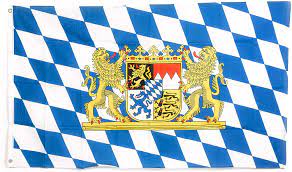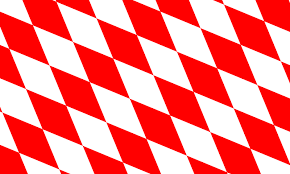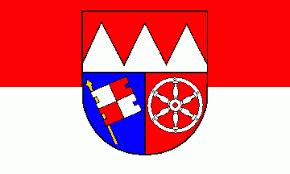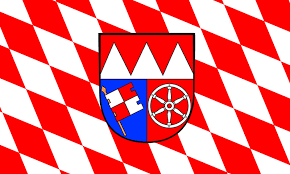(Dedicated to the Memories of Markus Reuß and Various Other Prejudices)
ABOUT FRANKEN (FRANCONIA)
For those still geographically challenged finding Transylvania, Franconia borders on the terrifying. A quick canter through two thousand years of European history reveals little except that the appellation d’origine contrôlée has a legitimate interest in the connection between Franken, the Franks, Frankreich, and France. After the fall of the Holy Roman Empire, the Franconians – unable to unite upper, middle, and lower separatists; rejecting French labelling requirements; fearful of being branded a suburb of Hamburg; and desperate to belong to something with a mutually intelligible tongue – launched a love-in with the Bavarians to the south. So intense was this crush that the Franconians believe that they have been united with Bavaria for some time. The infatuation is partially reciprocated by Munich 300 kilometers to the south, at least at tax time. The Franconian colours are even the same as the Bavarian ones, blue diamonds on a field of white tablecloth, except that there are no diamonds and the blue is red.

As the traditional Franconian metaphor says, history may have passed by much of the rich tapestry of this central European Appalachia, but a wealth of local custom testifies to a culture rooted deeply like a potato in the soil. Forgotten by history, the Franconians turned to their cups, erecting hundreds of breweries, of which 382 are extant. The generously-livered traveller may well come close to sampling the gamut of these great brews. Alas, when boozing, the average Frank exhibits all the flexibility of an Irishman at politics. Permitted to imbibe at the age of fourteen, most Franconians never taste another type of beer. The average Franconian will defend to the death the superiority of his or her particular local brew armed to the teeth with a total lack of comparative tastings. As for foreign beers not brewed according to the Reinheitsgebot (purity laws), need we say more. Fearful of sobriety sneaking up on them during a hop blight, or secretly wondering for what purpose Roman troops abused grapes in the dead of night, the Franconians, alone among Germans, succeeded in establishing a superior form of drinkable cooking wine, at times verging on the totally pleasant. Monogamous with beer, Franconians will promiscuously drink any grape from Ober-, Mittel-, or Unter-Franken. Not content with just beer and wine, local distilleries are not uncommon, in fact hidden just across the street from the Reuß’s, under a perfectly normal roof is a … well, that’s ample talk, you’ll find out soon enough.
Although not famed for their travelling or their seamanship, Franconians are at ease in conversations throughout most of the world. This ease is not due to any linguistic prowess, but largely because of their chameleonesque ability to make Franconian sound just as bad as the worst dialect in any other guttural tongue. Unfortunately, the Franconians have been largely unable to translate their own language back into German. The average English speaker may have a slight advantage in comprehension over the average German by virtue of quitting earlier. Those determined to have a go at the language will benefit from the use of the adjective/verb/noun/adverb/preposition/article, “gell” (pronounced like the “gel” in “hair gel” after the “g” has set). Use this as in the phrase – “guten gell Morgen, mein gell Mädchen” (good gell morning, my beautiful gell girl) or just “gell” (good gell morning my beautiful gell girl and give me your gelling phone number). In summary, any traveller is bound to have a good time in Franconia – und you vill too. And never forget Clark Gable’s immortal line: “Franken my dear? I don’t give a damn!”
ABOUT GETTING THERE
Where? you might ask. As we have explained to some, Pfersdorf is an extraordinarily large and important village, easily found on any map – just to the north east of Poppenhausen, which in turn is to the north west of Schweinfurt, which, as is well known, is just to the north east of Würzburg, which is a half smidgeon to the east of Frankfurt, which is apparently slightly east of London.

SOME UNBIASED FACTS:
Pfersdorf (“horse hamlet”): first mentioned in 764 AD has a population of about 450. Famous for the headwaters of the Werrn river, which are largely responsible for the Main, the Rhein, the North Sea and the Atlantic. Family seat of the vastly influential Reuß family (recently retired), Pfersdorf has been losing ground in recent years (the last fifty) to its arch-rival, Poppenhausen, but still retains much of its charm and character – tour the Hohgasse at night, stroll through the walnut groves, see the famous forest, drink from the village reservoir, marvel at the baroque church, and still be in time for breakfast at the Wirtschaft;
Poppenhausen (“puppet/doll house” to children): 3 km from Pfersdorf. Until recently comparable in size with Pfersdorf, the regional parvenu now has a population of about 1,400. Of some incidental consequence, a portion of this growth may be attributed to the recent founding of the Werner brewery in 1791. During a particularly nasty inter-village fishing contest, the Pfersdorfians wagered their kindergarten against the monopolistic might of the oppressive Sheriff of Poppenhausen and lost not just education, but also their brewery.
Schweinfurt (“pig fort”): 12 km from Pfersdorf, has a population of approximately 60,000. Bombed virtually into non-existence in 1944 because of its large ball bearing industry, and with the loss of all breweries, by the Americans during a daylight raid in which they lost nearly half their force. Schweinfurt has been rebuilt and is largely recovered with three fully-functioning breweries;
Würzburg (“sausage summit”): founded in the 7th century, 44 km from Pfersdorf, is an important seat of drinking and carousing – yes, a university town from the middle ages. The Irish saint, St Killian, came here around 680 AD bringing Catholicism and stout brewing to the region. As a town of kultur, it not only has its own breweries, but also imported beers from as far away as the distant Oberfranken town of Bamberg. Würzburg too was bombed nearly to extinction in 1945 and now attracts many of the seedier sorts of inhabitants – students, pharmacists, follically-challenged men, need we say more?;
Frankfurt (“fort against the gelling Frankens”): 200 km from Pfersdorf, is a minor town suitable for many types of transportation interchange. Here will be found a minor international airport for all of Europe, holding pens for international futures traders from British banks, key syllables for the Rocky Horror Picture Show and some semi-convenient rail stations. Extended periods of stay exceeding two hours are not recommended for the inexperienced traveller.
Now, surely you have worked out how to get there? Anyway, if you are in a rush, catch a flight to Frankfurt on Tuesday getting you in by about 18:30 in order to catch the second-to-last direct train to Würzburg (currently 19:54). Change at Würzburg to Schweinfurt to get in about 22:00.

… the above expression of prejudice was all in aid of helping visitors to our wedding on 17 & 18 May … so the text below is only to provide complete con-text:
ABOUT OUR WEDDING
Let us not kid ourselves. Some people at the wedding, two in number, will be taking on serious obligations witnessed by many of their nearest and dearest. Others, everyone else, will clearly be trying to have the time of their lives. This note is written for everyone except those two overly earnest types. We hope that this gives you enough information to know what you’re getting into.
Duration: we know that most people will be coming great distances to this tiny locale. We also know that attending the wedding will consume a large portion of many people’s free time. Yet, this is a unique chance for us to spend some time with our closest friends and family, and even our closest family (if that is possible) which we do not want to miss. We have arranged for a number of activities to take place from Wednesday, 15 May through Sunday, 19 May. For this reason, if you have the time, we would ideally like you to arrive as early as Tuesday evening. We hope that this provides opportunities for everyone to meet new friends and learn about one of the more interesting backwaters of Europe (the Main, that is). If you can spend any portion of this time with us, it will mean a lot to us.
Dress: at all events, except the wedding, dress is informal. For the wedding itself, attire appropriate to a church, not formal wear, is perfectly acceptable.
Language: there will be a large number of English speakers. There will also be a large number of German speakers (they seem to be particularly common in this region). There will also be a large number of bi-lingual types (all too frequently of the German speaker persuasion). Attempting the local language is not necessary, but does earn huge brownie points. Any reasonably comprehensive beer guide will contain the necessary grammatical constructions.
Teuerism: no, not a German longing for visitors, but the unfortunate realisation that prices in Germany can be a touch on the expensive side. The principal costs should be transportation, accommodation, touring, and food and drink. Transportation by plane to Frankfurt is a private matter between you and your travel agent. Transportation by train from Frankfurt to Schweinfurt return will be about US$70/UK£45/DM95. There should be no need for a car from Tuesday through Sunday as we are arranging buses or trains for all events. Enclosed are some indicative prices for hotels. The five events which we have arranged before the wedding might benefit on the day from a donation in the region of US$15/UK£10/DM25 for transportation, guides, what have you. So a budget for all five events of US$75/UK£50/ DM125 might be useful. This leaves food, drink, local taxis and trinkets for the natives. It is extremely difficult to be specific, but a daily budget of US$20 to 30/UK£12 to 18/DM30 to 40 might be reasonable.
Details: we shall send out further information on the latest train times, maps of the area, timetables for events, etc. to all who RSVP positively. Please let us know of any other information we can get for you, and share with everyone else.
ABOUT ACCOMMODATION
The centre for activities is Schweinfurt, and we have duly checked out a number of hotels in the town. Nothing is more than a short walk in Schweinfurt, i.e. it’s hard to get far in this town. There is a large shopping district for just about any conceivable requirement. Given German retailing laws, Schweinfurt has everything for just about the same prices as any major German city. Three hotels stand out:
Hotel Luitpold (***)
Summary: converted government offices (truly), which have managed to retain some of their bureaucratic charm. Hotel Luitpold is a down-to-earth hotel for the value conscious. They have given a 25% reduction to wedding guests.
Price range: Single room per night, with breakfast: DM 65
Double room per night, with breakfast: DM 100
Gasthof Zum Grafen Zeppelin
Summary: good value, clean lodging above a restaurant. The name gives away the decor to all you history buffs – some classic aerospace photos on the walls – ask about the excellent hydrogen fire precautions. The Gasthof has given a slight discount to wedding guests.
Price range: Single room per night, with breakfast: DM 65
Double room per night, with breakfast: DM 98
Hotel Ross (****)
Summary: probably the best hotel in Schweinfurt (we knew you wanted to know). Centrally located right in the Fussgänger/Pedestrian zone with a swimming pool. Probably the best hotel for anyone with special requirements. No discounts as yet.
Price range: Single room per night, with breakfast: DM 80 to 150
Double room per night, with breakfast: DM 130 to 200
We may get some further discounts for wedding guests as we make the bookings, although these are unlikely to be much more than another 5% or so.
Automobiles shouldn’t be necessary. If you are driving, parking in Schweinfurt can be difficult, but shouldn’t be expensive. If you don’t mind driving to events, we can recommend some country lodgings 10 to 20 kilometers from Schweinfurt with prices around DM 65 for a double room.

